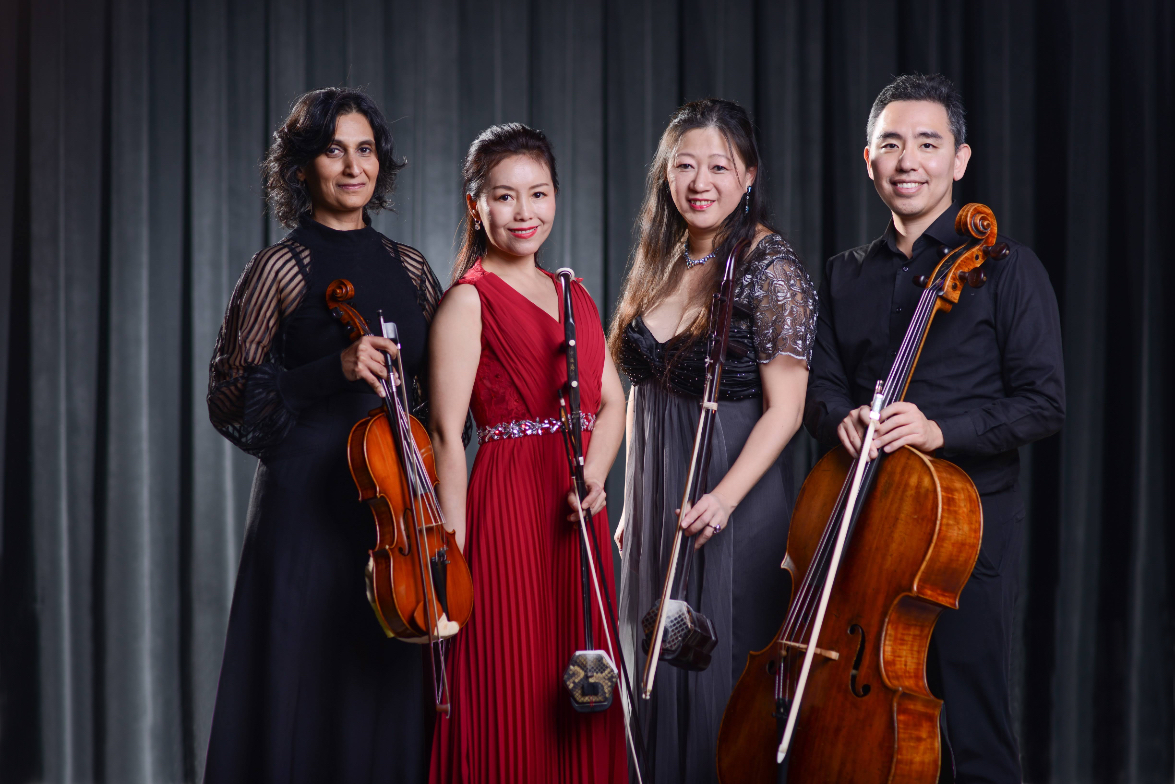https://www.createastir.ca/articles/vancouver-erhu-quartet-sound-of-dragon-the-annex
STIR (Vancouver) December 5, 2023
Vancouver Erhu Quartet epitomizes the spirit of intercultural music-making
The musicians are creating a kind of cultural fusion in the Sound of Dragon Society event

Sound of Dragon Society presents the Vancouver Erhu Quartet on December 10 at 4 pm at the Annex
No wonder bandleader and erhu virtuoso Lan Tung was thinking of calling the event Yin-Yang! A more finely balanced assortment of seeming opposites would be hard to imagine. Ultimately, though, what defines this event is how perfectly all of its elements fit together as one unified whole, epitomizing the spirit of intercultural music-making that Tung has pursued since arriving in Canada from Taiwan in 1994. As a founding member of the pioneering East/West fusion groups Orchid Ensemble, the Naadaleela Ensemble, and Proliferasian, artistic director of the Sound of Dragon Music Festival, a key player in the Vancouver Inter-Cultural Orchestra, and now with the Vancouver Erhu Quartet, which she convened in 2020, she’s shown that there are no opposites in music, only harmony.
In the new ensemble, Tung is joined by her fellow erhu player Jun Rong, violist Parmela Attariwala, and cellist Sungyong Lim: musicians of Chinese, Punjabi, and Korean heritage, respectively, and variously skilled in styles ranging from Western orchestral music, Asian chamber music, contemporary new music, and free improvisation. Together, they’re well-suited to tackling the very diverse scores that they’ll soon premiere at the Annex—and they’ll be helped by the happy accident that, despite the varied approaches taken by Yawen Wang, Moshe Denburg, Elizabeth Knudson, and Amir Eslami, all four composers have arrived at a somewhat similar place.
What they’re doing, in fact, is in itself a kind of cultural fusion. Although they’re working with written scores in the European manner, they also painting sonic scenes in a way that seems derived form Chinese classical music, which often attempts to convey a sense of the natural world via sound. It’s an approach that’s far from unheard of in Western music—consider Ludwig van Beethoven’s “Pastoral Symphony”, or the seasons as portrayed by artists as diverse as Antonio Vivaldi and Gustav Mahler—but it went somewhat out of favour during the abstract, dodecaphonic, and minimalistic 20th century.
With our newfound appreciation for the fragility of all life, however, nature and landscape are coming back into the concert hall.
For Denburg, Tung’s colleague in the Vancouver Inter-Cultural Orchestra, landscape and culture are fully intertwined—although in his case of his Harbours: Reunion & Tranquility, perhaps we should make that seascape and culture, instead.
“Moshe has been writing a series of pieces about harbours and oceans, like the piece he wrote for Sound of Dragon Ensemble, The Ocean of Tears,” Tung says. “He sees the harbour as a place of people coming together, people from different backgrounds—like a meeting place of different cultures.”
The implication, of course, is that Vancouver has become a safe haven for Denburg and all of his fellow musical travellers.
Sunday’s matinee concert also marks a return to our city for Wang, who had found a following here for her innovative musical-theatre productions before decamping to Montreal. Tung had to persuade her to return to chamber-music composition, but got an assist from Wang’s own wanderings.
“It took her a while to produce a piece, but everything went really quick when she came back from Morocco,” Tung says with a laugh, adding that the five movements of Wang’s Cinq fois par jour each express a different aspect of the North African world. “I’ve been two or three times to Morocco myself,” she adds, “so I know all the cities she talks about: the scenery, the people, the sounds, all the crazy roving entertainers, and the calls to prayer. If you’re in an area between a number of mosques, especially in the old towns, then when the time comes you’ll hear the call for prayer starting from different directions—maybe a minute after each other, but evenutally they will all blend. One of Yawen’s movements has this kind of effect—parts are passed around between the four players.”
Amir Eslami’s Illusion & Reality is more of an inner journey, and stems from the ney (cane flute) player and composer’s emotional and intellectual response to hearing the Vancouver Erhu Quartet’s first performance. “He was interested in this instrumentation and its sound, and he proposed to write a piece,” Tung explains. “I’ve been playing with Amir in another group, Naadaleela, so we’ve known each other as band members, and in that band everybody composes for each other. So this is natural for him—another step of writing for the erhu.”
Meanwhile, the three segments of Elizabeth Knudson’s September Songs—“The Hummingbird”, “To the Rising Moon”, and “Tunnels of Light”—return us to the natural world by way of our avian companions, Rumi’s Sufi poetry, and the ever-changing beauty of clouds. There’s also some intuitive influence from Knudson’s own intercultural explorations.
“The first movement of September Songs uses a very typical Hindustani scale, and even very typical phrasing,” Tung says. “When I pointed that out to her she wasn’t really conscious of it, but of course she had studied the sitar, so she’s learned a bit of Indian music! And the phrases, I’ve chosen to play them with the fingering and the expression that I’ve learned from Hindustani violin techniques.”
Tung also notes that all four composers sometimes juxtapose the Vancouver Erhu Quartet’s paired erhus against the viola and cello—another expression of her yin-yang conception. But this won’t make for musical squabbles: it’s impossible to have yin without yang, and ultimately all is one.
